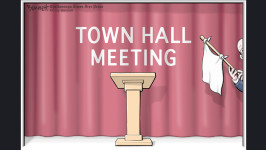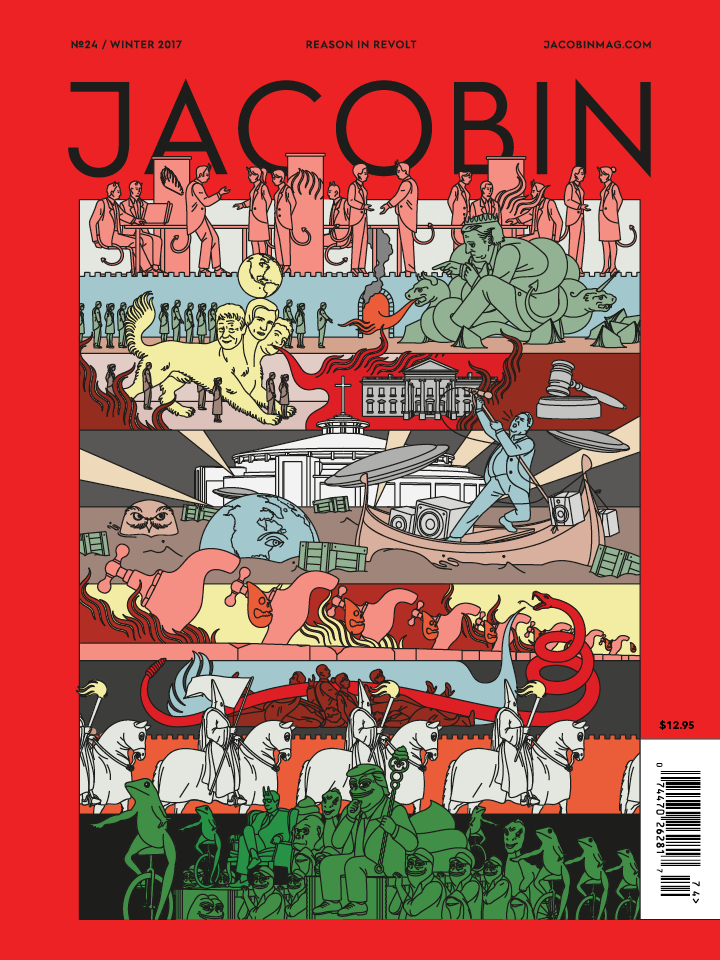Bulletin N° 740
Subject : 'Bad Vibrations' producing 'New Conjunctures' in the World Economy of Corporate Capitalism, with Enhanced Militarism & Climate Change.
28 February 2017
Grenoble, France
Dear Colleagues and Friends of CEIMSA,
Understanding the difference between a contradiction and an opposition
–like the indispensable distinction between conjunction
and linear cause-and-effect, or between revolt and revolution--
can prevent embarking on a path towards epistemological error of
major proportions. Historical study is one practice for verifying or
questioning ideas which are offered as guides for behavior. By conflating the meanings of such
ideas, this useful and critical practice is suspended. The red army’s victory over
European fascism, for example, (despite calculatedly belated assistance
from the US) was indeed an opposition of historical significance, but to
understand the limitations on the actual setback suffered by fascist forces at
the end of the WW II, we must first consider the economic, political, and
cultural contradictions which gave rise to 20th-century Fascism (in
all its manifestations) as a dominant ideology, an international cultural
expression governing relationships at every level. By demonizing the apologists
of fascism, we are merely attaching labels rather than sharing analyses and perceptions
of real-life experiences, we contribute to the heat but not to the light. Socialists
must keep their 'eyes on the prize' --as the Black Civil Rights slogan admonishes
us to do- and ignore Party demagogues
whose promiscuous financial backing does not withstand careful scrutiny and
which, in all cases, defines the limits of their own species of ‘populist
rhetoric’. It is in the silent zones --nestled safely along the taboo regions
of political landscapes and historical knowledge-- that the core interests of the ruling-class
can be observed, not in their rhetoric.
Authentic democratic socialist politics is found first at the local
level; this politics requires cutting through the “Gordian Knot” of inaction
(being in-itself) in order to enter
into new modes of engagement (being
for-itself) on very real, material terrain, not simply spinning symbolic
constructions out of thin air, which at best may be found later buried beneath a scrapheap
of forgotten protest materials and splendid hypocrisies.
The remarkable three-ring circus which we see before us today under
the ‘big tent’ of Late Capitalism
–a location for simultaneous performances by Republican, Democrat, &
Deep-State ‘entertainers’-- is a stunningly cruel and truly frightening
exhibition of concentrated force in the name of . . . well, who else but ‘the people’. At
many levels this is a blood sport! and just to witness
it implies a degree of complicity. For this reason we oppose it, to regain some
balance for strictly existential reasons, and without much hope of actually
uprooting the original structure which threatens us, as the Soviet Union’s
military almost did in Nazi Germany, at great human cost. (Perhaps
the very best history of this momentous encounter is Russia at War, 1941-1945,
by Alexander Werth.)
Meanwhile, the histoire
de long durée of Fernand
Braudel brings into perspective the rich contextual
reading of early historical events, which can only help us better understand who we are in the
present capitalist setting and what viable options have appeared and disappeared at given
moments in history. In his third and final volume of Civilization
& Capitalism, 15th – 18th Century, Braudel begins with a theoretical introduction attempting
to define his approach to divisions of space and time in early modern history.
Time like space, can be divided up. Our
problem now is to use such divisions, at which historians excel,
the better to locate chronologically and the better to understand those
historical monsters, the world-economies. [The latter term is used by Braudel to designate geographically expanded economies, as
opposed to local, regional and national economies.] It is not an easy task, for
in their slow historical progress they admit only approximate dates: a period
of growth can be dated to somewhere between ten and twenty years and not always
then; a change in center of gravity might take more than a century . . . . So
we are dealing with history in slow motion, with journeys that seem
never-ending and so lacking in revealing incidents that there is a risk of
inaccuracy in reconstructing their routes. These huge leviathans seem suspended
in time: history takes centuries to build or destroy them.
A further difficulty is that we have to use
the only services available, those of conjunctural
history, the history of short- and medium-term change, and this is naturally
more concerned with short-lived movements than with the slow-moving shifts and
fluctuations we are looking for. Our first step must be therefore to offer a
preliminary explanation to help us to look beyond these short-term movements –
the one of course which it is easiest to detect and interpret.
It was about fifty years ago that the social
sciences made the discovery that human life was subject to fluctuations and
swings of periodic movements, which carry on in endless succession. Such
movements, harmonious or discordant, bring to mind the vibrating cords or
sounding-boards of schoolday physics. G.H. Bousquet
for instance wrote in 1923: ‘The different aspects of social movements [have]
an undulating rhythmic profile, not one that is invariable or varies regularly,
but one marked by periods when [their] intensity increases or diminishes’. ‘Social
movement’ can be taken to refer to all the movements at work in a given
society, the combination of movements which forms the conjuncture or
rather the conjunctures. For there may be different conjunctural
rhythms affecting the economy, political life, demography and indeed collective
attitudes, preoccupations, crime, the different schools of art or literature,
even fashion (although fashion in dress changes so quickly in the West that it
is more a question of the day-to-day than the conjunctural).
Of all these, only the economic conjuncture has been seriously studies, if not
pursued to its logical conclusion. So conjunctural
history is extremely complex and by no means complete, as we shall see when we
have to draw some conclusions.(pp.71-72)
. . .
On the question of how long-term conjuctures can be explained, Braudel
writes:
Economists
and historians have observed and described these movements and noted how they
are superimposed, just as the tide, as François Simiand
put it, carries on its back the shorter movements of the waves; the experts
have also paid much attention to their many consequences, and are always surprised
at their extent and their external regularity.
But they have never tried to explain why
they happen, why they develop and succeed each other. The only initiative in
this direction concerns Juglar cycles, which some
people have tried to connect with sunspots!
No one seriously believes in such a close connection. And how is one to explain
other types of cycle . . . ?
. . .
To clarify (I cannot say resolve) this impossible
problem, one should perhaps have recourse to the periodic vibrations we are
taught about in elementary physics. Movement is the consequence of an external
impact as when a string or blade is struck, and of the response of the body
which is made to vibrate. The strings of a violin vibrate under the bow. One
vibration can naturally lead to another; when a body of soldiers comes to a bridge
it has to break step, otherwise the bridge would vibrate in time to their
marching feet and might in certain circumstances shatter like glass. So let us
imagine that in the complex conjuncture, one movement can have an impact on
another, and then on a third and so on.
The most important impact is undoubtedly
that caused by external, exogenous causes. The ancient régime
economy, as Giuseppe Palomba has said, was dominated
by the calendar, which brought a host of servitudes and vibrations caused by
the harvest of course, but to take one example, winter was the season par
excellence when peasant-artisans sat down to work. And there were also
phenomena beyond the control of men and their authorities, times of plenty and
times of famine, market fluctuations which might spread, the vicissitudes of
foreign trade and the consequences these might have on ‘domestic’ prices: any
contact between inside and outside meant a breach or a wound.
But just as important as the external impact
is the context in which it occurs: is it possible to identify a finite plane or
body which, being the site of a movement, fixes its time-space? I have a
distant memory (1950) of a conversation with Professor Urbain,
the professor of economics at Louvain University, who
was always extremely careful to relate price variations to the area or volume
they concerned. According to him, only those prices which obtained in the same
vibrating plane were comparable. The vibrations caused by the impact of prices
are felt, in fact, in the previously established networks which in my view constitute
vibrating surfaces par excellence: price structures (to use the term in a
slightly different sense from Léon Dupriez). The reader will see what I am getting at: the
world-economy is the greatest possible vibrating surface, one which not only
accepts the conjuncture but, as a certain depth or level, manufactures it. It
is the world-economy at all events which creates the uniformity of price over a
huge area, as an arterial system distributes blood throughout a living organism.
It is a structure in itself. The problem still remains however whether, despite
the coincidences I have pointed out, the secular trend is or is not a good
indicator of this sounding-board. My view is that the secular vibration;
inexplicable without this huge but finite surface of the world-economy, opens,
closes and opens once again the gates of the complex flow of the conjuncture.
I am not sure that economic and historical
research is being directed today towards these long-term problems. Pierre Léon once wrote: ‘Historians have usually remained indifferent
to the long term.’ Ernest Labrousse even wrote at the
beginning of his thesis, ‘I have abandoned any attempt at an explanation of
long-term movements.’ Within the time-span of an intercycle,
the secular trend can of course be ignored. Witold
Kula on the other hand is interested in the long-term movements which ‘by their
cumulative actions provoke structural transformations’, but he is almost alone
in this. Michel Morineau at the other extreme, has
called for a history that restores ‘to the experience of life its savour, its intensity and its event-studded fabric’. And Pïerre Vilar has pleaded that the
short-term should not be lost from sight, for this would mean ‘systematically
drawing a veil over all conflicts and class struggles; these stand revealed,
both in the ancient régime and under capitalism, in short-term
events’. We do not have to take sides in this debate which is rally a false
debate, since the conjuncture should be studied in all its richness: it would
be regrettable if historians did not seek to locate its boundaries on one side
in the history of events and the short term, and on the other in the long-term
and the secular trend. The short and the long-term coexist; they cannot be
separated. [John Maynard] Keynes whose theory was built on the short-term made
the much-quoted remark: ‘In the long run we are all dead’ –a remark which if it
were not a joke would be both banal and absurd. For we all live in both the
long-term and the short-term: the language I speak; the trade I practice, my
beliefs, the human landscape surrounding me are all inherited; they existed
before me and will go on existing after me.(pp.82-85)
. . .
[An] empire, a sort of super-state which
might cover the entire area of a world-economy, presents us with a broader
problem. On the whole, the world-empires, as [Immanuel] Wallerstein calls
them, were no doubt archaic formations, representing ancient triumphs of the
political over the economic. But during the period covered by this book, they
were still in existence outside the western world: the Mogul Empire in India,
the Chinese and Persian Empires, the Ottoman Empire and the Empire of the Tsars
in Muscovy. Wallerstein has argued that wherever
there was an empire, the underlying world-economy was unable to develop –that
its career was stunted. It might also be argued that these were examples of the
command economy, to use John Hicks’s term, or of the Asiatic mode of
production, in Marx’s now-dated phrase.
It is true that an economy’s wings could be
clipped by the demands and constraints of an imperial policy without means of
redress. No merchant or capitalist could ever feel completely free under an
empire. Michael Catacuzenus, who was a sort of Fugger
to the Ottoman Empire, was summarily hanged on 13 March 1578, at the gates of
his own luxurious palace at Anchioli in Istanbul, on
the orders of the sultan. In China, Heshen, the
ultra-rich favourite minister of the emperor K’ien Long, was executed and his fortune confiscated by the
new emperor, after his master’s death. In Russia, Prince Gagarin, the governor of
Siberia, although a master of prevarication, was beheaded in 1720. And one
thinks of course of Jacques Coeur, Semblançay and
Fouquet in France: in their own way, their trials (and the execution of Semblançay) tell us something of the political and economic
conditions in France. Only a capitalist regime, however archaic it might be,
had the stomach to swallow and digest such scandals.
All the same, I am personally inclined to
think that even under the constraints of an oppressive empire with little concern
for the particular interests of its different possessions, a world-economy
could, even if rudely handled and closely watched, still survive and organize
itself, extending significantly beyond the imperial frontiers: the Romans
traded in the Red Sea and the Indian Ocean; the Armenian merchants of Julfa, the suburb of Isfahan, spread over almost the entire
world; the Indian Banyans went as far as Moscow; Chinese merchants frequented
all the ports of the East Indies; Muscovy established its ascendancy over the
mighty periphery of Siberia in record time. I grant that Wittforgel
is not mistaken when he says that in these political high-pressure areas of the
empires of traditional southern and eastern Asia, ‘the state was much stronger
than society’ –stronger than society it may have been; but it was not stronger
than the economy.
To return to the European example, can we
not say that it escaped very soon from the stifling embrace of empire? The
Roman Empire was at once more and less than Europe; the Carolingian and Ottonian Empires had little control over a Europe already
in decline. The Church, while it succeeded in extending its culture over the
entire surface of Europe, failed in the end to establish its political
supremacy. (pp.54-55)
Braudel elsewhere defines society as ‘a set of sets,’ each
set exhibiting its own internal organization as a ‘sub-system’ of the whole.
The economic set of world-scale
capitalism, he observes, extends beyond the limits of political systems within specific institutions, and, according to
this historian, cultural organization
cannot be contained by global capitalism.
Culture is
the oldest character in human history: economies succeed each others, political
institutions crumble, societies replace each other, but civilization continues
along its way. . . . Civilization is the grandfather, the
patriarch of world history.(p.65)
The 20 items below offer insights into four
social ‘sets’ that constitute the context of our lives –economics, politics,
culture, and social hierarchy—and hopefully will offer readers various ‘points
of entry’ into collective actions to appropriate control over our lives from
the abuses of capitalist interests and the mental alienation it must continually
promote in order to retain power over us.
Sincerely,
Francis Feeley
Professor emeritus of
American Studies
University
Grenoble-Alpes
Director of Research
University of
Paris-Nanterre
Center for the Advanced Study
of American Institutions and Social Movements
The University of
California-San Diego
a.
Fuck Trump and the Donkey He Rode in On
https://zcomm.org/znetarticle/fuck-trump-and-the-donkey-he-rode-in-on/
by Michael Albert
(November 21, 2016)
===========
b.
Robert Mercer: the big data billionaire waging war on mainstream
media
With links to Donald
Trump, Steve Bannon and Nigel Farage,
the rightwing US computer scientist is at the heart of a multimillion-dollar
propaganda network.
===========
c.
At GOP Town Halls, Constituents Express
Rage Over Plans to Nix Obamacare

Republicans
faced angry crowds who questioned their elected officials about the future of
the ACA
===========
d.
Blood in the Water: the Trump Revolution Ends
in a Whimper
http://www.counterpunch.org/2017/02/17/blood-in-the-water-the-trump-revolution-ends-in-a-whimper/
by Mike Whitney
===========
e.
The Swamp Strikes Back
https://sputniknews.com/columnists/201702151050696849-flynn-trump-administration-swamp/
by Pepe
Escobar
Even before Flynn’s fall, Russian
analysts had been avidly discussing whether President Trump is the new Viktor Yanukovych — who failed to stop a color revolution
at his doorstep. The Made in USA color
revolution by the axis of Deep State neocons, Democratic neoliberalcons
and corporate media will be pursued, relentlessly, 24/7. But more than Yanukovych, Trump might actually be remixing Little Helmsman Deng Xiaoping: “crossing the river while
feeling the stones”. Rather, crossing the swamp while feeling the crocs. - See
more at: http://www.informationclearinghouse.info/46455.htm#sthash.jZlJu7wi.dpuf
===========
f.
Greenwald:
Empowering the "Deep State" to Undermine Trump is
Prescription
for Destroying Democracy
http://www.informationclearinghouse.info/46476.htm
===========
g.
|
|

http://www.informationclearinghouse.info/46529.htm
by David Swanson
This April 4th will be 100 years since the U.S.
Senate voted to declare war on Germany and 50 since Martin Luther King Jr. spoke
out against the war on Vietnam (49 since he was killed on that speech’s first
anniversary). Events are being planned to
help us try to finally learn some lessons, to move beyond, not just Vietnam,
but war. That declaration of war on Germany was not for the war that makes up
the single most common theme of U.S. entertainment and history. It was for the
war that came before that one. This was the Great War, the war to end all wars,
the war without which the conditions for the next war would not have existed.
===========
h.
From: Jim O'Brien
Sent: Monday, 27 February, 2017
Subject: [haw-info] HAW Notes 2/27/17: Links to recent articles of
interest
http://www.historiansagainstwar.org/
Links to Recent Articles of Interest
“Why Should Trump –Or Anyone – Be Able to Launch a Nuclear
War?”
By Lawrence S. Wittner, History News Network, posted February 26,
2017
The author is a
professor of history emeritus at SUNY Albany.
By Christy Thornton
and Stuart Schrader, Jacobin, posted February 24
The authors are,
respectively, a history faculty member at Rowan University and a post-doctoral
fellow at the Charles Warren Center, Harvard University.
“How the U.S. Began Its Empire”
By Jackson Lears, New York Review of Books, February
23 issue
The author teaches
history at Rutgers University. This is a review essay on Stephen Kinzer’s new book The True Flag, on imperialism and anti-imperialism at the
turn of the twentieth century.
“How We Got Here: The Misuse of American Military Power and
the Middle East in Chaos”
By Major Danny Sjursen, TomDispatch.com, posted February 22
The author is a U.S. Army strategist and former history
instructor at West Point.
“Dorothea Lange’s Censored Photographs of the Japanese American
Internment”
By Linda
Gordon, Asia Pacific Journal: Japan Focus, posted February
18, 2017
The author teaches
history at New York University.
“Why Do So ManyAmericans
Fear Muslims? Decades of Denial about America’s Role in the World”
By Jon Schwarz, The
Intercept, posted February 18
“Quit Calling DonaldTrump
and Isolationist. He’s Worse than That”
By Stephen
Wertheim, Washington Post, posted February 17
The author is a Fellow
in History at King’s College, University of Cambridge.
“Lessons and Propaganda from the
Botched Raid on Yemen”
By William J. Astore, AntiWar.com, posted February 13
The author, a retired
Air Force lieutenant colonel, taught history for fifteen years at military and
civilian schools.
By David
Blight, The Atlantic, posted February 7
The author teaches
history at Yale University.
Thanks to an anonymous
reader for suggesting one of the above articles. Suggestions can be sent
to jimobrien48@gmail.com.
===========
i.
Is Trump the Worst President Ever?
http://www.counterpunch.org/2017/02/17/is-trump-the-worst-president-ever/
Although Donald Trump has only been in office for a few weeks, it is
hard to go anywhere and not hear that he is the worst ever American president.
Neither Richard Nixon nor Warren Harding, or even the thirty days of William
Henry Harrison’s pneumonia, are believed to rank in his bottom-feeding
percentile. But if Donald is that bad, it may go down as his greatest
achievement.
===========
j.
Be Thankful for a Dysfunctional,
Chaotic White House
http://therealnews.com/t2/story:18466:Be-Thankful-for-a-Dysfunctional%2C-Chaotic-White-House
Henry
Giroux and Paul Jay discuss the Trump-Bannon-Pence
administration, a naked display of the 1% ruling without apologies and damn
what comes tomorrow
===========
k.
How Far we Have
Fallen as a Nation, as a Culture for That Matter
http://www.informationclearinghouse.info/46536.htm
by Philip Farruggio
A
must see movie for all Americans is “Inherit the Wind” (1960, Stanley Kramer,
Director). To those who never saw this film, it accurately portrays the 1925 Scopes Monkey Trial in
Dayton, Tennessee. The trial of substitute high school teacher John Scopes was
for breaking Tennessee’s Butler Act, which
forbade the teaching of evolution in state-funded schools. In a nutshell, the
film had many levels to it in addition to the story line of questioning the
legality of such a law. What really frightened this
writer, and yes, frightened is the proper word to use, is how 92 years later
America has not (to use the apropos word) evolved at
all!
===========
j.
German Intel Clears Russia on Interference
https://consortiumnews.com/2017/02/15/german-intel-clears-russia-on-interference/
Mainstream
U.S. media only wants stories of Russian perfidy, so when German intelligence
cleared Moscow of suspected subversion of German democracy, the silence was
deafening, says ex-CIA analyst Ray McGovern. - See more
at: http://www.informationclearinghouse.info/46467.htm#sthash.pccGPeMQ.dpuf
===========
l.
The US
coup d’état goes viral

https://sputniknews.com/politics/201702161050766466-tillerson-lavrov-meeting-awkward-moment/
===========
m.
Trump Relinquishes Control of Foreign
Policy
http://www.counterpunch.org/2017/02/24/mcmaster-takes-charge-trump-relinquishes-control-of-foreign-policy/
by Mike Whitney
The
war party is back in power and the odds of normal relations with Russia have
dropped to zero. The appointment of Army Lieutenant General H.R. McMaster to
the position of national security adviser indicates that Trump has
done an about-face on his most critical foreign policy issue,
normalizing relations with Russia. General Michael Flynn– who recently stepped
down from the post following allegations of lying to Vice President Mike
Pence –was the main proponent of easing tensions with Moscow which
is a position that had been enthusiastically embraced by
President Donald Trump. But McMaster does not support normalizing relations
with Russia, in fact, McMaster sees Russia as a
“hostile revisionist power” that “annex(es)
territory, intimidates our allies, develops nuclear weapons, and uses proxies
under the cover of modernized conventional militaries.” So, what’s going on?
Why has Trump put a Moscow-hating hawk like McMaster in a position
where he’ll be able to intensify the pressure on Russia, increase the
provocations and, very likely, trigger a conflagration between the two
nuclear-armed superpowers?
===========
n.
The Trump Presidency: RIP

http://www.informationclearinghouse.info/46465.htm
by Paul Craig Roberts
===========
o.
Listening to Trump (on the campaign trail)
an
analysis
https://zcomm.org/znetarticle/listening-to-trump/
(November 21, 2016)
===========
p.
France: Another Ghastly Presidential Election
Campaign; the Deep State Rises to the Surface
===========
q.
#StopTrump:
Protests Erupt Across Britain
as
Lawmakers Debate Canceling Trump's State Visit
https://www.democracynow.org/2017/2/21/stoptrump_protests_erupt_across_britain_as
===========
r.
From: "Jacobin
Magazine" <auth@jacobinmag.com>
Sent: Tuesday, 21 February, 2017
Subject: Jacobin + Up From Darkness
|
A few times a day, an otherwise blissful
moment is interrupted and we remember that Donald Trump is president. A few times a day, an otherwise blissful
moment is interrupted and we remember that Donald Trump is president. Donald Trump’s election was a disaster for
working people — but we're seeing a fight back that is saving us from total
despair. Still, young movements need ideas and we need
to know our enemy better. With this in mind, we put together today’s new
edition, “Journey to the Dark
Side.” As usual, it’s a visually beautiful issue, and inside we
make sure to provide historical context to help readers situate Trumpism. We look to examples from home and abroad to
draw out potential lessons about how to beat the populist right and construct
an alternative that can build a majority of a very different sort. We hope you get a chance to check out the
issue. If you’re a first-time subscriber, you can follow this link to get
four issues at a discounted rate. If you’re an existing subscriber, your copy
is on the way! |
===========
s.
Trump Intensifies His Attacks
on Journalists and Condemns F.B.I. ‘Leakers’
by JULIE
HIRSCHFELD DAVIS and MICHAEL
M. GRYNBAUM
&
http://www.bbc.com/news/world-us-canada-39088820
===========
t.
From: "Karen
Topakian, Greenpeace" <webmaster@greenpeaceusa.org>
Sent: Saturday, 25 February, 2017
Subject: Did you see that RESIST banner above the White House? That was
us.
Greenpeace Activists Unfurl
Massive 'Resist' Banner Near White House
Greenpeace
|
|
||||
|
Francis-
I can hardly believe it was a
month ago today that I — along with six other Greenpeace activists — climbed
a giant crane and unfurled a massive hand-painted RESIST banner high above the
White House. We were there to send a message to all those who want to resist
Trump’s attacks on environmental, social, economic, and educational justice
to rise up for a better United States of America.
|
||||




